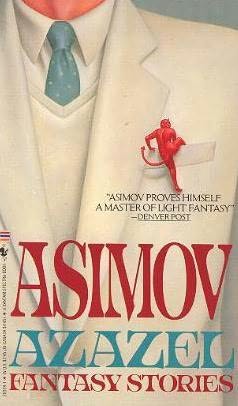 Though known primarily for his works of science fiction, with such classics as the Foundation series and the Robot stories, Dr. Isaac Asimov (named Grand Master in 1988 by the Science Fiction and Fantasy Writers of America) was a master of numerous genres. It was claimed that his 465+ published books spanned every major division of the Dewey Decimal System, making him, for a time, America’s most prolific author. And among those many genres, Asimov dabbled in the realm of fantasy.
Though known primarily for his works of science fiction, with such classics as the Foundation series and the Robot stories, Dr. Isaac Asimov (named Grand Master in 1988 by the Science Fiction and Fantasy Writers of America) was a master of numerous genres. It was claimed that his 465+ published books spanned every major division of the Dewey Decimal System, making him, for a time, America’s most prolific author. And among those many genres, Asimov dabbled in the realm of fantasy.
Azazel is a collection of eighteen of his modern fantasy stories, all written during the 1980s. They originated in a story Asimov wrote for a monthly mystery magazine, but, as the editor objected to the recurring fantasy elements, he soon found a home for an altered version of the concept at the Magazine of Fantasy and Science Fiction . After two such stories, the editor at Isaac Asimov’s Science Fiction Magazine objected to the titular head of the magazine selling stories elsewhere, and thus, the next sixteen found a home at IASFM.
That’s the history behind this unusual and whimsical collection. It’s as chameleonlike as the author, having masqueraded as mystery, fantasy, and even science fiction. However, since the ultimate decision was to label them as fantasy, I have no hesitations about bringing Azazel to your attention.
Simply put, the title character, Azazel, is a two-millimeter-high demon, possessed of powers beyond our comprehension, but seemingly still a “nobody” in his own home plane of existence. As a result, he occasionally can be convinced to help people.
Now, not all of the blame for what befalls the recipients of his efforts can be placed upon Azazel. In fact, most of it can be placed solely on the human he associates with. But first, let me back up and explain. You see, every one of the stories is told from a rather interesting viewpoint: With Asimov himself as the unnamed but identifiable audience, a man by the name of George Bitternut recounts story after story of his often-unpredictable association with the demon Azazel.
George is someone we all know well. He’s the perpetual freeloader, possessed of an unending assortment of friends, godchildren, associates and other such beneficiaries of his attention. He’s arrogant, egotistical, always broke and always trying to scam his way to riches and women, and he’s got a story for every occasion. He’s the sort who’ll pocket the tip, borrow another fiver, and still leave you hanging with the check. He’s always willing to bend the ear of the listener, after a good meal or a few drinks, and so we’re treated to multiple stories of how he and Azazel changed someone’s life….
Unfortunately, human error, demon unfamiliarity with our world, and just plain carelessness mean that a never-ending assortment of George’s friends (all with names like Juniper Pen, Baldur Anderson, Elderberry Muggs, Minerva Shlump, Vissarion Johnson, Octavius Ott, Sophocles Moskowitz, Ishtar Mistik, and Menander Block — Rosie O’Donnell, while a perfectly normal name, does remind one of the similarly-named actress) succumb to a variety of catastrophes, all brought on by the philosophy of “be careful what you ask for.”
That’s right. Exact wording counts when you make deals with demons, and you get what you pay for, and if there’s no cost to you, then….
Asimov’s Azazel tales are clever, sharp, and written in a manner wholly un-Asimov (by his admission), and contain more than a faint trace of P. G. Wodehouse. They’re overblown, exaggerated, humorous, and tragic nonetheless. It’s a rare character who finds lasting happiness in these stories. Whether it’s bringing a statue to life, letting someone fly without wings, making the perfect basketball star, helping someone find true love, or reducing an impatient author’s idle time, rest assured that there’s a way to make them regret what they ask for.
George himself suffers as well, blowing get-rich-quick opportunities and friendships at every turn, but showing up right on schedule with a new tale of woe and mayhem for his faithful audience in the next story. He never learns, but would we be as entertained if he did?
If you’re looking for a little light reading, all with Asimov’s typical quality, intelligence, and dry humor, this is a book for you. The stories are all on the short side, and pass by quickly, but they’re like chips; you can’t read just one at a time. This book is likely out of print, so you may have to go digging through used bookstores or libraries. But it’s worth it. Asimov clearly placed himself in the ranks of the master fantasists with these stories, which cleverly disguise themselves as whatever you’d like them to be: fantasy, science fiction without the science, fables with the traditional moral at the end, or what-have-you. Azazel is worth looking for. It’s good, honest fun.
